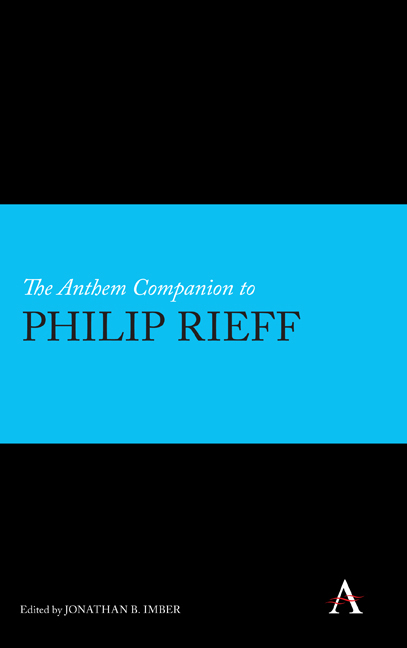Book contents
- Frontmatter
- Contents
- Introduction
- Chapter 1 Philip Rieff: Some Reflections
- Chapter 2 Philip Rieff and the Impossible Culture
- Chapter 3 Philip Rieff as Cultural Critic
- Chapter 4 Philip Rieff as Teacher
- Chapter 5 Prophet v. Stoic: Philip Rieff's Case against Freud
- Chapter 6 Decline and Fall in the Work of Philip Rieff: “I love the old questions” Beckett, Endgame
- Chapter 7 Philip Rieff as Social/ Cultural Theorist
- Chapter 8 Fellow Sons
- Chapter 9 Philip Rieff and Social Theory
- Chapter 10 A Kindly Apocalypse: Philip Rieff and the Endgame of the Therapeutic
- Chapter 11 Disenchantment, Authenticity and Ordinary Charisma
- Writings of Philip Rieff
- List of Contributors
- Index
Chapter 11 - Disenchantment, Authenticity and Ordinary Charisma
Published online by Cambridge University Press: 21 June 2018
- Frontmatter
- Contents
- Introduction
- Chapter 1 Philip Rieff: Some Reflections
- Chapter 2 Philip Rieff and the Impossible Culture
- Chapter 3 Philip Rieff as Cultural Critic
- Chapter 4 Philip Rieff as Teacher
- Chapter 5 Prophet v. Stoic: Philip Rieff's Case against Freud
- Chapter 6 Decline and Fall in the Work of Philip Rieff: “I love the old questions” Beckett, Endgame
- Chapter 7 Philip Rieff as Social/ Cultural Theorist
- Chapter 8 Fellow Sons
- Chapter 9 Philip Rieff and Social Theory
- Chapter 10 A Kindly Apocalypse: Philip Rieff and the Endgame of the Therapeutic
- Chapter 11 Disenchantment, Authenticity and Ordinary Charisma
- Writings of Philip Rieff
- List of Contributors
- Index
Summary
If we move from these external facts about postwar consumerism to the self- understandings that went along with them, we see a steady spread of what I have called the culture of “authenticity.” I mean the understanding of life that emerged with the Romantic expressivism of the late eighteenth century, that each of us has his or her own way of realizing one's own humanity, and that it is important to find and live out one's own, as against surrendering to conformity with a model imposed from outside, by society, or the previous generation, or religious or political authority. This had been the standpoint of many intellectuals and artists during the nineteenth and early twentieth centuries. One can trace the strengthening, even radicalization of this ethos among some cultural élites throughout this period, a growing sense of the right, even duty, to resist “bourgeois” or established codes and standards, to declare openly for the art and the mode of life that they felt inspired to create and live. The defining of its own ethos by the Bloomsbury milieu was an important stage on this road in early twentieth- century England, and the sense of the epochal change is reflected in the famous words of Virginia Woolf: “On or about December 1910, human nature changed.” A somewhat parallel moment comes with André Gide's “coming out” as a homosexual in the 1920s, a move in which desire, morality, and a sense of integrity came together […] But it was only in the era after the Second World War that this ethic of authenticity began to shape the outlook of societyin general.
– Charles Taylor, Varieties of Religion TodayA very considerable originative power had once been claimed for sincerity, but nothing to match the marvelous generative force that out modern judgment assigns to authenticity, which implies the downward movement through all the cultural superstructures to some place where all movement ends, and begins.
– Lionel Trilling, Sincerity and AuthenticityWhen Philip Rieff's The Triumph of the Therapeutic was first published in 1966, it was instantly recognized as a book to be reckoned with by a drove of what we now call public intellectuals.
- Type
- Chapter
- Information
- The Anthem Companion to Philip Rieff , pp. 189 - 214Publisher: Anthem PressPrint publication year: 2018

